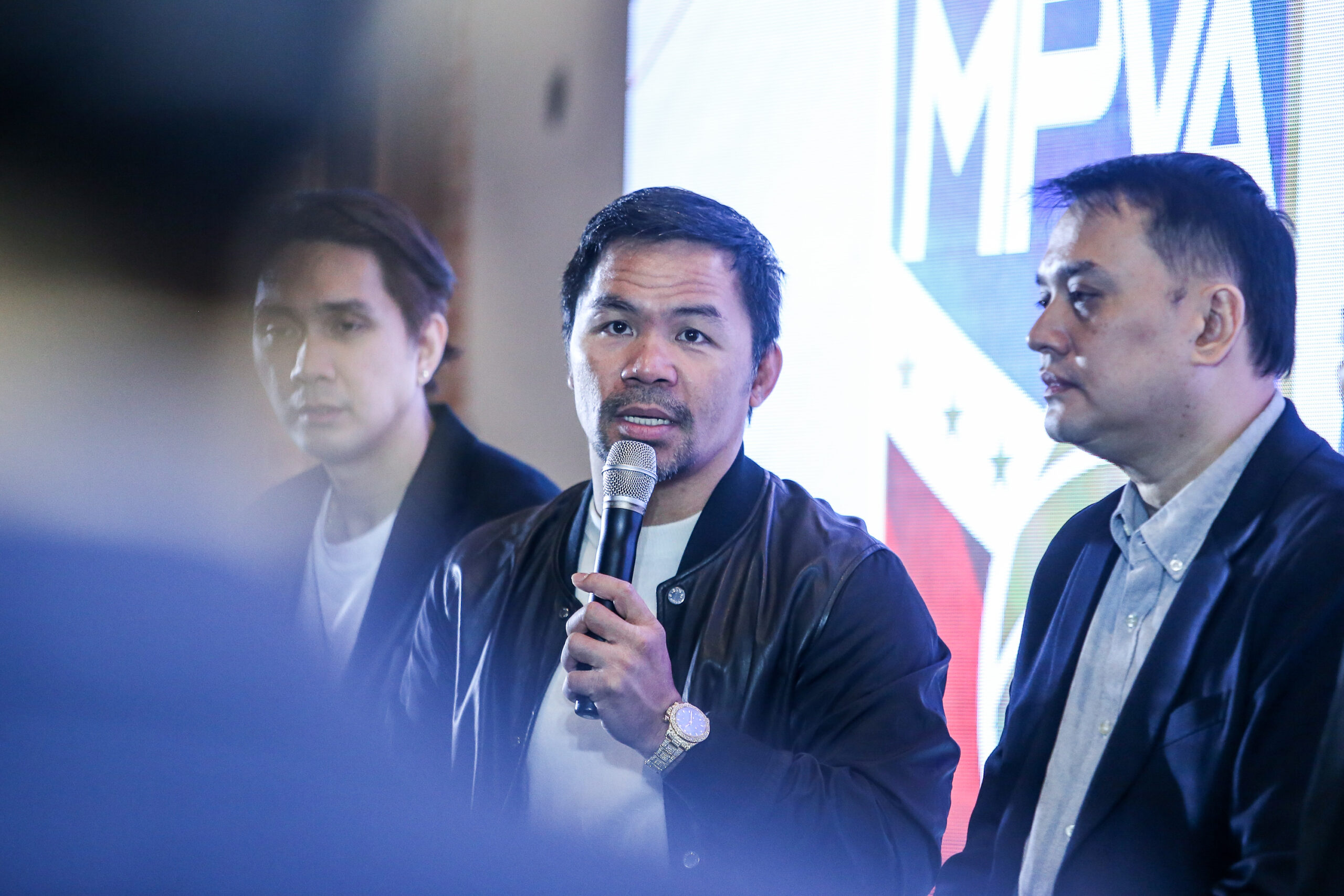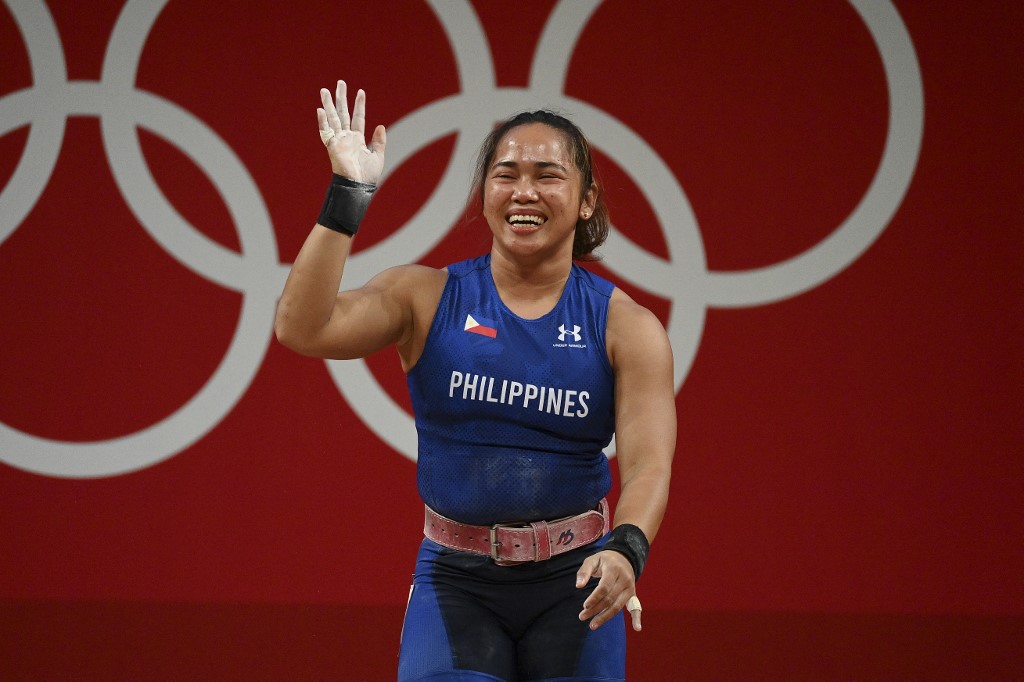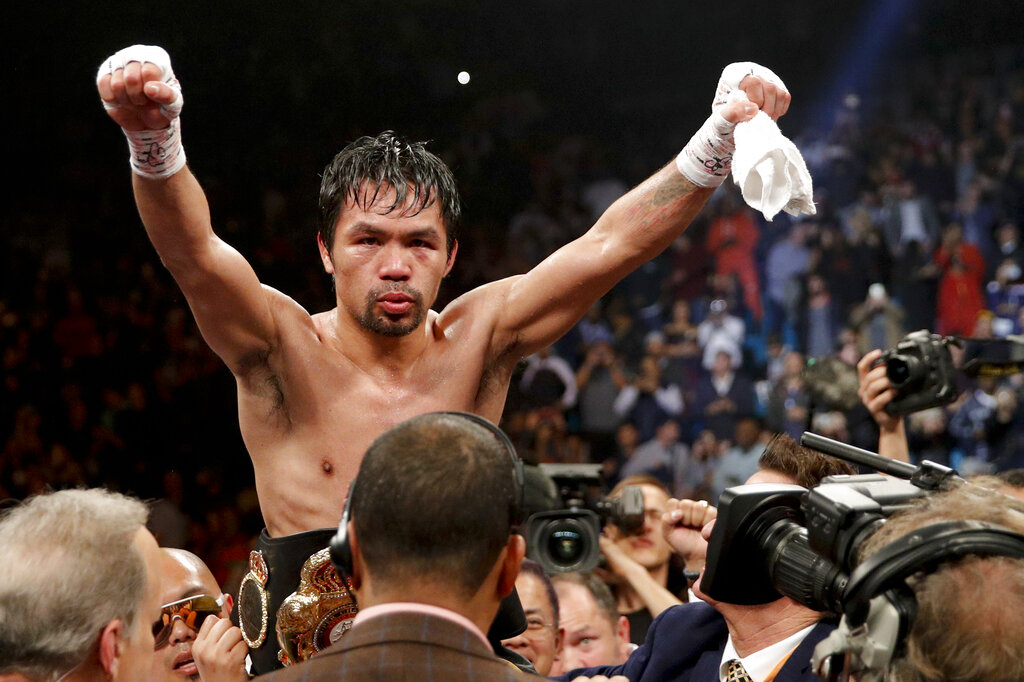
Filipino boxing legend Manny Pacquiao during a press conference for theMaharlika Pilipinas Volleyball Association. –MARLO CUETO/INQUIRER.net
As he made his way through a maze of round tables, his entourage considerably thinned from the last time I covered him, Manny Pacquiao smiled and offered fist bumps, handshakes and waves to everyone who greeted him.
“Good morning,” he told well-wishers, with that familiar voice that once was a staple of Vegas podiums, late-night American talk shows, Senate hearings and television interviews. “Thanks for coming.”
It’s a voice that used to clog up my phone’s memory—Manny Pacquiao, in so many words, declaring: The Filipino athlete is meant for greatness.
“For me, impossible doesn’t mean anything,” Pacquiao said on Friday, before lunch was served during a press conference that launched his new project, the Maharlika Pilipinas Volleyball Association.
There is no reason to doubt the sincerity of his words.
In the late 90s and early 2000s, if someone had said Oscar De La Hoya would be fighting a Vegas headliner against a Filipino, he would have been met with an incredulous chuckle. It’s not that Filipino fighters did not have the skill to match up with the Golden Boy. But a Filipino in a neon-lit, Strip-side casino marquee?
“Why not?” Pacquiao asked then. Soon later, the fighting pride of the Philippines retired De La Hoya and became a headliner himself.
Pacquiao unlocked a new level of faith within Filipino athletes so that when sporting glory is at stake, they know they are entitled to fight for it.
The voice memos are gone now, frozen in an old-model phone that conked out, taking with it years and years of audacity spoken in a familiar tone.
The message, however, lingers in different voices.
“This proves we can do it. They said this was impossible. I thought this was impossible. But the Filipino can do it. We just have to believe.”
That’s Manny Pacquiao speaking through weightlifter Hidilyn Diaz, who uttered those words when she won the Philippines’ first Olympic gold medal.
“I’m not playing [for] second [place]. I’m not doing all these just to be the runnerup. I always go for the win.”
Pole vault star EJ Obiena’s voice. Pacquiao’s confidence.
“I always knew I was gonna see [the national anthem played in the World Cup] one day in my life,” Filipinas captain Hali Long said.

Philippines’ Hidilyn Diaz gestures during the women’s 55kg weightlifting competition during the Tokyo 2020 Olympic Games at the Tokyo International Forum in Tokyo on July 26, 2021. (Photo by Vincenzo PINTO / AFP)
Pacquiao’s thoughts exactly, whenever the “Lupang Hinirang” was sung in each of his fights.
Diaz, Obiena and the Filipinas, who not only qualified for the World Cup but also scored a historic goal and victory there, are a huge part of why we are in a golden generation in Philippine sports.
Carlos Yulo is a gymnastics world champion. Twice. As a Filipino, Yuka Saso won a historic golf major. Alex Eala won a historic girls’ tennis Grand Slam event. Like Pacquiao, these athletes share a common pluck. They never believed that greatness was out of reach.
Beleaguered former national basketball coach Chot Reyes could only shrug his shoulders and flash a wry smile when told that what made it even tougher for fans to swallow Gilas Pilipinas’ struggles in the Fiba World Cup is that amid this rare run of glory for the Philippines in sporting arenas, no one is settling for moral victories anymore.
And that’s not a bad thing, not by any stretch.
“As a Filipino who has brought honor to the country, my dream is to have more young athletes do the same, bring glory to the Philippines,” Pacquiao said.
“What I want is for [the world] to not [overlook] the Philippines [in sports].”

Manny Pacquiao celebrates his win against Adrien Broner in the WBA welterweight title boxing match Saturday, Jan. 19, 2019, in Las Vegas. (AP Photo/John Locher)
But to announce one’s self—and, by extension, the Philippines—as a contender, as someone who, like Obiena, refuses to settle for second, takes a certain kind of boldness.
“I see that quality in a lot of young athletes nowadays and all they really need is attention and support,” Pacquiao said, saying his latest pet project aims to provide such attention and support to the grassroots.
That quality, that boldness, has a predecessor.
A generation is often measured as at least 20 years. If this current golden era stretches into Paris 2024, then this generational success could be traced back to around 2003 to 2005, when a young Filipino boxer with a smashing left hand and a dangerous right hook that had its own nickname—Manila Ice—was punching his way through the Mexican bully trinity: Barrera. Marquez. Morales.
However he is viewed beyond sport’s borders, it will not detract from his accomplishment on top of the ring.
Manny Pacquiao is still the country’s greatest athlete of all time, one whose legacy goes beyond his record boxing feats. Pacquiao unlocked a new level of faith within Filipino athletes so that when sporting glory is at stake, they know they are entitled to fight for it.
And they have every right to believe “they can be winners.”
This time, I was hearing that old message in his voice again.
Read Next
Subscribe to INQUIRER PLUS to get access to The Philippine Daily Inquirer & other 70+ titles, share up to 5 gadgets, listen to the news, download as early as 4am & share articles on social media. Call 896 6000.



